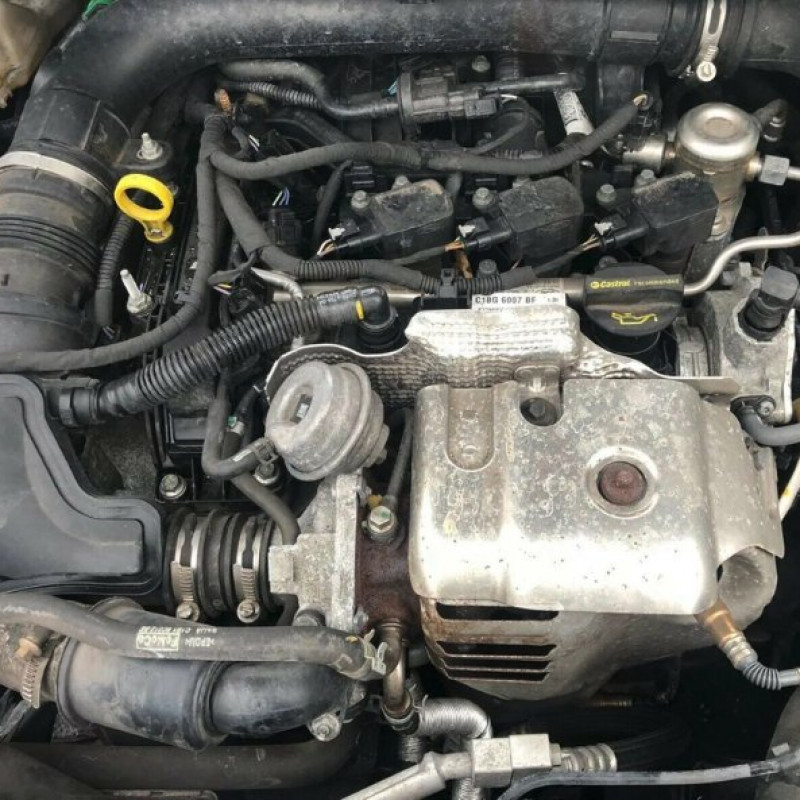The Role of a Quality Ford Fiesta Engine in Vehicle Performance
The Role of a Quality Ford Fiesta Engine in Vehicle Performance
Blog Article
Opening the Power of Engines: A Comprehensive Guide to Efficiency and Effectiveness
Comprehending the complex auto mechanics of engines is vital for both efficiency fanatics and daily motorists. The responses might redefine our method to engine efficiency and performance in ways that are both informing and important.
Comprehending Engine Essentials
What makes up the essential technicians of an engine? At its core, an engine is an equipment developed to convert fuel into mechanical energy via a series of controlled surges or combustion procedures.
The crankshaft after that transforms this linear activity into rotational energy, which ultimately powers the automobile. The camshaft controls the opening and closing of the shutoffs, controling the intake of air and gas and the expulsion of exhaust gases. In addition, the engine depends on a very carefully calibrated fuel-air mixture, ignition system, and cooling down system to make sure ideal performance and efficiency.
Recognizing engine fundamentals additionally includes recognizing the significance of engine cycles, such as the four-stroke cycle, that includes consumption, compression, exhaust, and power strokes. Each phase is vital in guaranteeing the engine operates smoothly and properly. Mastery of these essential mechanics prepares for exploring more complex engine characteristics and performance metrics, essential for enhancing both power result and performance.
Trick Performance Metrics
Trick performance metrics are necessary for examining an engine's efficiency and power result, supplying valuable insights for both makers and customers. These metrics work as criteria for engine efficiency, permitting educated choices in style, production, and buying.
Among the key metrics is horsepower, which measures the engine's capability to carry out work over time. Torque, determined in pound-feet, is one more critical statistics that shows the engine's rotational pressure, directly affecting acceleration and pulling capacity. Fuel performance, commonly determined in miles per gallon (MPG) or litres per 100 kilometers (L/100km), analyzes how properly the engine transforms fuel right into activity, affecting operational prices and environmental factors to consider.
Furthermore, thermal effectiveness steps how well an engine converts gas energy right into valuable work, exposing insights right into energy losses mainly with warm. Emission degrees, consisting of CO2 and NOx, are also vital, showing the engine's environmental influence and compliance with regulatory standards.

Tuning Methods for Efficiency
Tuning techniques play a considerable function in boosting engine performance by optimizing efficiency metrics recognized in earlier conversations (ford fiesta engine). Numerous approaches exist to fine-tune an engine, each adding to improved fuel economic situation and lowered exhausts
One reliable strategy is readjusting the air-fuel ratio, making sure the engine runs within the optimum burning regime. A leaner mixture can enhance fuel efficiency, but it must be balanced to stop misfires or engine knock. In addition, reprogramming the engine monitoring system can rectify criteria such as ignition timing, which better find more info boosts effectiveness while maintaining power output.
An additional essential strategy entails changing the intake visit the site and exhaust systems. Upgrading to high-performance air filters and exhaust headers can reduce back stress, facilitating better airflow. This permits the engine to take a breath more freely, resulting in enhanced combustion efficiency.
In addition, the execution of sophisticated tuning devices, like dyno screening, supplies accurate data that makes it possible for targeted modifications. Consistently monitoring these efficiency metrics guarantees that tuning efforts produce the wanted effectiveness outcomes. Jointly, these methods not just boost engine efficiency however also add to long-term sustainability in engine operations.
Maintenance for Optimal Efficiency
Routine engine maintenance is crucial for accomplishing ideal performance and longevity. A properly maintained engine not just operates successfully but additionally lessens the risk of pricey repairs and malfunctions. Trick components needing normal attention consist of oil, filters, belts, and trigger plugs.
Changing the engine oil at suggested periods is crucial, as oil lubricates relocating components and prevents overheating. Replacing oil and air filters guarantees that pollutants do not harm engine feature. Disregarding these components can cause minimized performance and potential engine damage.
Additionally, checking and replacing used belts and pipes is essential to stop sudden failures. Timing belts, specifically, should be replaced according to the producer's routine to prevent disastrous engine damages.
Ignition system must additionally be examined and changed as needed, since they play a vital duty in ignition and fuel efficiency.
Future Trends in Engine Technology
Accepting developments in technology, the future of engine layout is positioned to revolutionize efficiency and effectiveness across numerous applications. Hybrid and totally electrical powertrains are ending up being increasingly conventional, providing reduced discharges and enhanced gas efficiency.
Furthermore, technologies in materials science are leading to lighter, more powerful components that boost engine efficiency while decreasing power consumption. Advanced production techniques, such as 3D printing, permit the creation of complex geometries that boost air flow and thermal monitoring, therefore maximizing combustion procedures.
Additionally, the assimilation of expert system and machine understanding is set to transform engine diagnostics and efficiency adjusting. These technologies can assess vast amounts of have a peek at this site information in actual time, enabling anticipating upkeep and customized performance enhancements.
Verdict
In conclusion, unlocking the power of engines calls for a comprehensive understanding of their technicians and performance metrics. Implementing reliable tuning methods and adhering to normal upkeep techniques significantly boost engine capabilities.
Furthermore, the engine relies on a thoroughly adjusted fuel-air blend, ignition system, and cooling system to make certain optimal efficiency and effectiveness.
Understanding engine essentials likewise entails recognizing the significance of engine cycles, such as the four-stroke cycle, which consists of intake, exhaust, compression, and power strokes. Mastery of these basic mechanics lays the foundation for checking out a lot more complex engine characteristics and performance metrics, crucial for optimizing both power result and efficiency.

Accepting improvements in innovation, the future of engine design is poised to revolutionize performance and performance throughout different applications.
Report this page